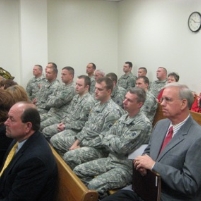Veterans’ Courts May Go National
Monday, March 08, 2010
 Veterans' Court, Tulsa, Oklahoma
Veterans' Court, Tulsa, Oklahoma
In recent years there has been a growing movement to grant veterans special treatment within the American legal system. In January 2008 this resulted in the first veterans' court in Buffalo, NY. Since then, 22 other cities and counties have also begun to experiment with similar institutions. These courts focus more on treatment and rehabilitation, so that nonviolent veterans can deal with their problems and be successfully reintegrated into society rather than remaining untreated and clogging up courtrooms and detention facilities.The increasing number of these courts around the nation has prompted the federal government to begin evaluating and considering them as well, with legislation being introduced by Massachusetts Senator John Kerry, a veteran, and Alaskan Senator Lisa Murkowski for increased funding of these projects.
The call for such facilities for veterans stems from increasing research showing the intense symptoms and widespread effect of maladies such as Post-Traumatic Stress Disorder, severe depression, and other mental disorders that afflict veterans. Numerous studies estimate that between 20 and 50 percent of Afghanistan and Iraq war veterans suffer from such afflictions. These veterans subsequently receive no treatment or the wrong kinds of treatment and thus have difficulties readjusting to civilian life. Many argue that this leads veterans to make up a disproportionate percentage of people with criminal records. The Department of Veterans Affairs estimates that veterans account for 10 percent of those with criminal records in the United States. Proponents of these courts contend that since there are specialized courts to deal with others, such as drug, mental health, and domestic violence courts, there should be, and is a precedent for, special courts for veterans and their unique troubles.
Opposition groups however, argue that these courts would unfairly provide a section of the population with more civil liberties than others. Criminals with military histories would essentially be given a free pass. There is also concern that these courts may also be used for violent veteran offenders. In addition, some contend that the label of veteran is at once too broad and too narrow. It encompasses all who served from World War II to the present wars and who suffer from very different afflictions or from none at all. At the same time, the label excludes all of those who suffer from the same conditions many veterans do, but who have not done military service.
- Kyle Kuersten
A Separate Peace (by Dahlia Lithwick, Newsweek)
Helping those who Served Us (editorial, Johnston Tribune-Democrat)
Philly Opens a Criminal Court Just for Veterans (by by John McDevitt,KYW-1060)
Specter Holds Special Meeting on Veteran's Court (WTAE, ABC,Pittsburgh)
Special Courts Give Veterans an Extra Break (by Noel Brinkerhoff, AllGov)
Allegheny County Courts Considers New Division for War Veterans (WTAE, ABC,Pittsburgh)
- Top Stories
- Unusual News
- Where is the Money Going?
- Controversies
- U.S. and the World
- Appointments and Resignations
- Latest News
- What If China Invaded the United States?
- Donald Trump Has a Mental Health Problem and It Has a Name
- Trump Goes on Renaming Frenzy
- Trump Deports JD Vance and His Wife
- Trump Offers to Return Alaska to Russia






Comments